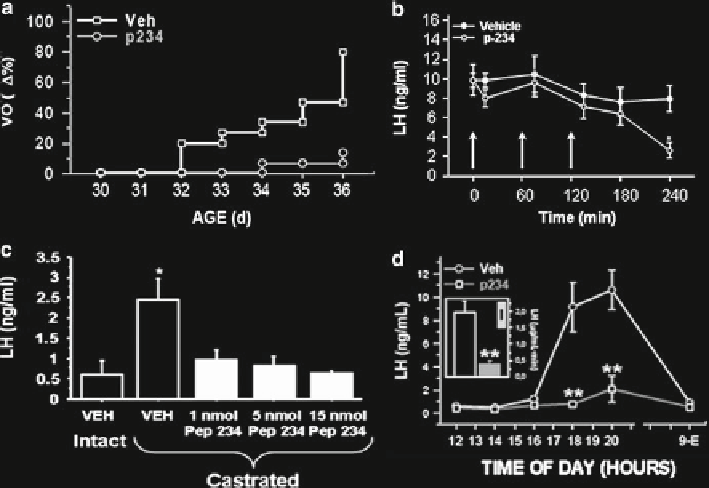Biology Reference
In-Depth Information
Fig. 8.13
Peptide 234 delays puberty and inhibits castration rise in LH and the pre-ovulatory LH
surge. (
a
) Effects of continuous infusion of peptide 234 on puberty onset in female rats. The impact
of chronic i.c.v. infusion of the peptide 234, into pubertal female rats (d30-d36) on puberty onset
shows a delay.
VO
vaginal opening. (
b
) Castrated male rats were given three infusions (indicated
by
arrows
) of 1 nmol peptide 234 at 0, 60, and 120 min, which signifi cantly inhibited LH secretion
after 240 min (
n
= 10; *
P
< 0.05). (
c
) Dose-response graph for castrated male mice given two i.c.v.
infusions of peptide 234, 60 min apart, indicating that all three doses tested are able to inhibit the
post-castration rise in LH.
Bars
show mean ± SEM (*
P
<0.05 compared with other groups).
(
d
) Effects of continuous infusion of peptide 234 on pre-ovulatory surge of LH in rats. Mean serum
LH levels in both groups, as well as integrated LH secretion between 14:00 h and 20:00 h of pro-
estrus (AUC; bar graph) in (
d
), are shown. Numeric values on
x-
axis represent daytime (hour)
during the afternoon and evening of proestrus. Hormonal levels at the morning of oestrus (
9-E
) are
also shown. **
P
< 0.01 vs. corresponding control group. (From Roseweir, A.K., et al., Discovery
of potent kisspeptin antagonists delineate physiological mechanisms of gonadotropin regulation.
J Neurosci. 2009. 29(12):3920-9, with permission from The Society for Neuroscience and from
Pineda, R., et al., Critical roles of kisspeptins in female puberty and preovulatory gonadotropin
surges as revealed by a novel antagonist. Endocrinology. 151(2):722-30. Reprinted with permis-
sion from The Endocrine Society)
and rats induced an increase in
Kiss1
gene expression in the ARC nucleus which is
reversed by gonadal steroid replacement [
8
,
10
,
13
]. However, there is no direct
evidence that gonadectomy results in increased KP secretion. To address this issue,
KP antagonist, peptide 234, was infused i.c.v. into castrated male rats and mice [
26
].
Two or three i.c.v. injections of Peptide 234 inhibited the castration-induced rise in
LH in both rats (Fig.
8.13b
) and mice (Fig.
8.13c
). This is consistent with data that
KP neurons express sex steroid receptors [
14
,
33
]. It therefore appears that a sub-
stantial part of sex steroid feedback on GnRH secretion is mediated via the KP
system (Fig.
8.14
).

Search WWH ::

Custom Search